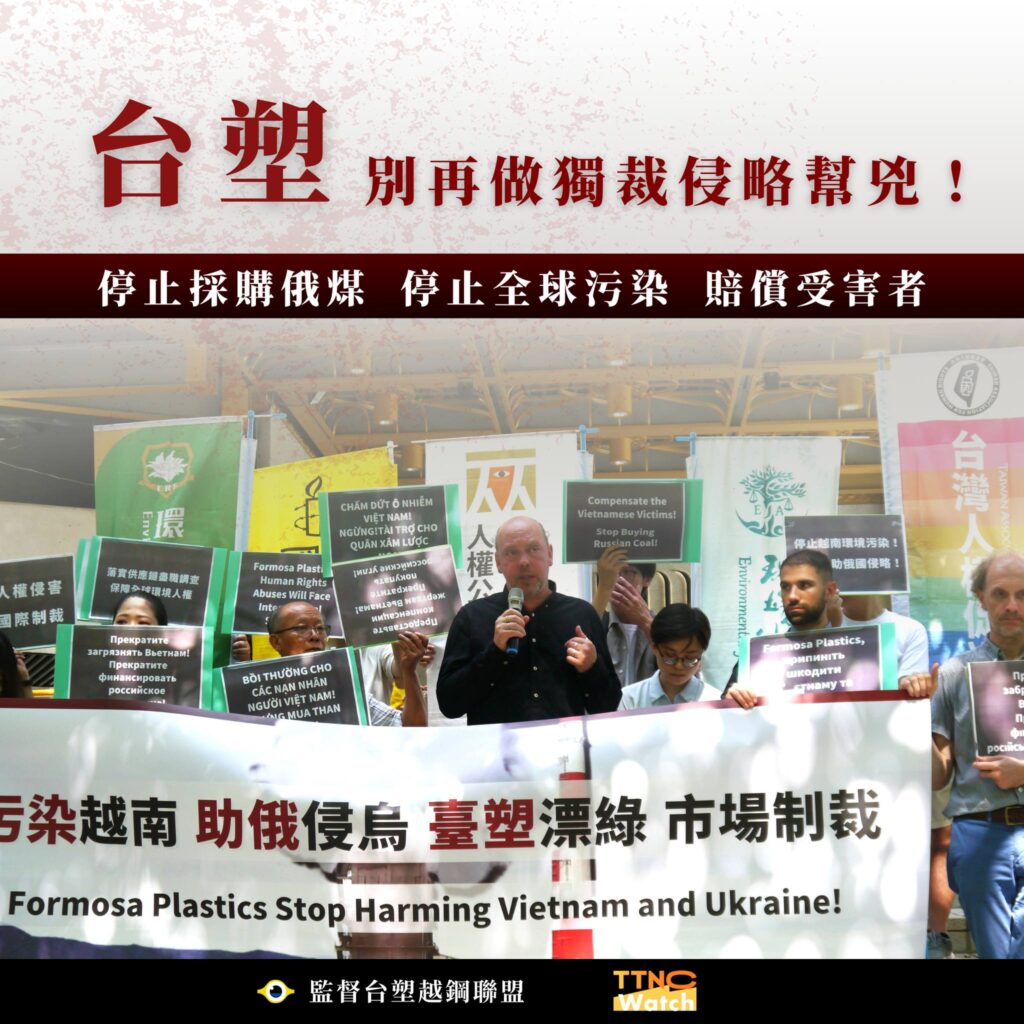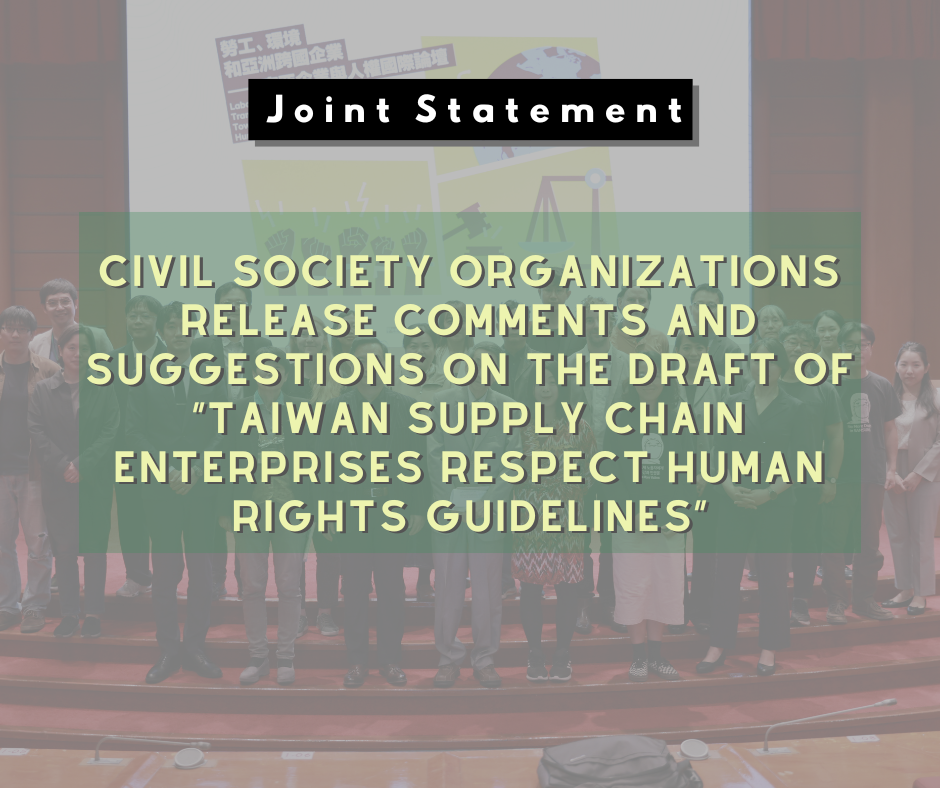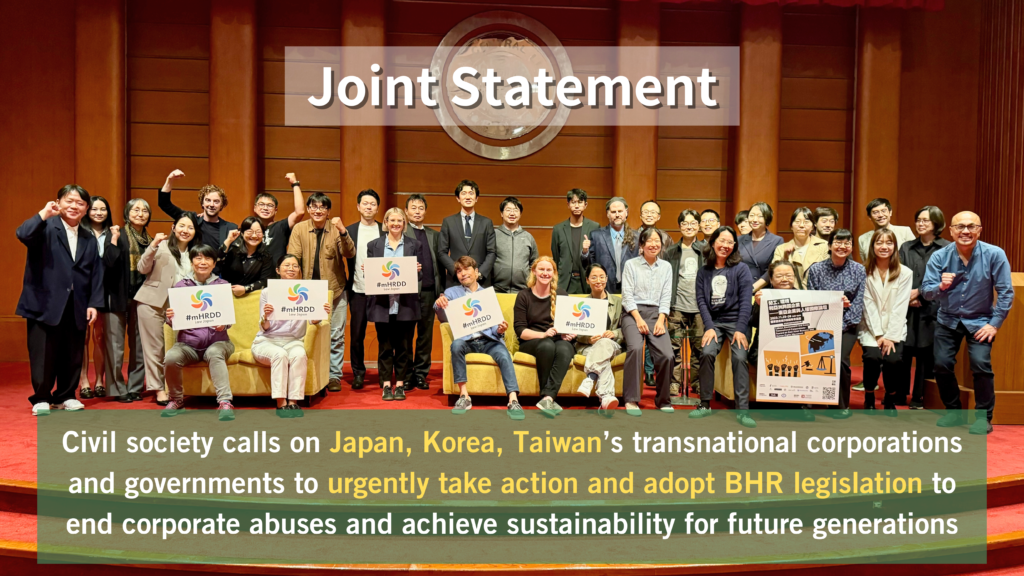Polluting Vietnam, Aiding Russia’s Invasion of Ukraine, Market Will Sanction Formosa Plastics Group’s Greenwashing
Monitor Formosa Alliance and Taiwan Transnational Corporation Watch (TTNC Watch) held a press conference today (June 19) before Formosa Plastics Corporation’s annual general meeting, titled “Polluting Vietnam, Aiding Russia’s Invasion of Ukraine, Market Will Sanction Formosa Plastics Group’s Greenwashing.” They revealed that Formosa Plastics is a major buyer of Russian coal imported into Taiwan, thereby funding Russia’s invasion of Ukraine. Additionally, the human rights and environmental violations caused by Formosa Ha Tinh Steel Corporation in Vietnam remain unresolved, with the oppression faced by the victims worsening.
Two representatives from Europe attended the event: Vladimir Slivyak, founder of the Russian environmental group Ecodefense and winner of the 2021 Right Livelihood Award, and Isaac Levi, Europe-Russia Policy & Energy Analysis Team Lead at the Centre for Research on Energy and Clean Air (CREA). They, along with researchers Hsu Po Jen and Sun Hsin Hsuan from the Environmental Rights Foundation, directly entered the Formosa Plastics shareholders meeting. They called on the top management of Formosa Plastics to stop purchasing Russian coal, cease global pollution, and compensate the victims, providing concrete plans and timelines. Otherwise, under the global supply chain’s sustainability reforms, Formosa Plastics will face significant sanction risks and could be eliminated from the market. However, representatives of Formosa Plastics did not provide any response at the shareholders meeting.
Formosa Plastics Group’s Purchase of Russian Coal Violates Human Rights and Go Against Global Sanction Trends
Vladimir Slivyak, founder of the Russian environmental organization Ecodefense, stated that the war in Ukraine, which has now lasted over two years, has caused tens of thousands of innocent Ukrainian casualties, with many more forced to live in fear and under threat. He asserted that resisting Russian aggression and authoritarianism is an unavoidable responsibility for democratic countries worldwide.
Mr. Slivyak pointed out that fossil fuels are one of the most crucial economic lifelines supporting Russia’s authoritarian regime and its external aggressions. This is why, following Putin’s full-scale invasion in 2022, European countries and the United States promptly imposed bans on importing Russian fossil fuels. However, Taiwanese companies continue to purchase coal from Russia, with Formosa Plastics Group being one of the major buyers. This ongoing purchase effectively funds the dictator’s war of aggression, harming the Ukrainian people. This practice not only violates Formosa Plastics’ own sustainability commitments but also severely damages Taiwan’s image within the international democratic community.
Mr. Slivyak called on Formosa Plastics Group, as a major Taiwanese corporation, to immediately cease purchasing coal from Russia. He emphasized that continuing to support a regime that invades, violates human rights, and destroys the environment not only makes them complicit but also poses a significant risk to investors.
Isaac Levi, Europe-Russia Policy & Energy Analysis Team Lead at the Centre for Research on Energy and Clean Air (CREA), added that Taiwan has become the fifth-largest importer of Russian coal globally since the Russia-Ukraine war began. Over the past year, the volume of Russian coal imported by Taiwanese companies has continued to grow, increasing dependence on Russian coal, which is deeply concerning.
Mr.Levi stated that according to CREA’s statistics, Formosa Plastics Group has purchased over $100 million worth of Russian coal since the onset of the war, making it one of Taiwan’s largest buyers of Russian coal. These expenditures are funding the Russian government’s military aggression. Taiwan has increased its reliance on Russian coal from 12% of their total supply in 2022 to 18% in 2024.
Mr.Levi also highlighted that key suppliers of Russian coal to Taiwan in the past two years, including Suek AG, appear to be added on the United States sanctions list. If Taiwanese companies engage in transactions with sanctioned Russian entities, they risk significant repercussions by being added to the sanctions list. From an energy security angle, it is essential that Taiwan reduces its reliance on energy sources from one seller to avoid the threat of spikes in prices and supply issues.
Mr.Levi urged Formosa Plastics Group to quickly present a concrete plan and timeline to stop purchasing Russian coal. He also called for transparency by publicly disclosing relevant information, allowing Taiwanese and international communities, along with Formosa’s global shareholders and investors, to scrutinize their actions.
Formosa Plastics Group’s Pollution Spans the Globe; Vietnamese Victims Face Continuous Repression by Authoritarian Regime
Father Peter Nguyen Van Hung stated that the actions of the Vietnamese government represent a severe violation of human rights and a blatant obstruction of justice. Victims seeking legal redress have been systematically denied access to the courts, with the government employing police forces to torture and subsequently imprison activists who dare to advocate for justice. This oppressive behavior extends beyond the activists themselves, as the government has also harassed and threatened the relatives of those who lodge complaints, creating an atmosphere of fear and intimidation designed to silence dissent.
Father Nguyen further noted that in a recent escalation, the government mobilized local security forces and police to prevent plaintiffs from traveling to Hanoi. This move was specifically aimed at obstructing their efforts to authorize Taiwanese lawyers to prosecute the board of directors of Formosa Steel Ha-Tinh, a company implicated in significant environmental and social harm. By blocking these plaintiffs from seeking international legal assistance, the government denies justice to the victims and shields corporate wrongdoers from accountability.
Father Nguyen pointed out that these actions highlight a systematic abuse of power and a deliberate strategy to suppress any attempts at legal recourse. The international community must take note of these egregious violations and pressure the Vietnamese government to respect human rights, ensure the safety and freedom of activists and their families, and allow due process in the pursuit of justice against Formosa Steel Ha-Tinh. Without such intervention, the victims will continue to suffer in silence, and the principles of justice and human dignity will remain under threat in Vietnam.
Chiang Meng Chen, office director, Covenant Watch, read a statement on behalf of Patricia Gossman, Associate Asia Director at Human Rights Watch. The statement emphasized that Formosa admitted responsibility for the disaster and pledged US$500 million in compensation—not to the victims but to the Vietnamese government. Residents of affected provinces have complained about the lack of transparency in the payment of the compensation, including obstacles to claiming damages and misappropriation of funds by local authorities. Moreover,Vietnamese authorities have also repressed protests over the disaster, with at least 41 activists involved in the protests sentenced to to many years in prison, and 31 still behind bars. Taiwan’s courts should consider other methods of notarization and extend the deadline for submission, which is currently the end of this week. The courts should not compound injustice by accommodating Vietnamese government repression.
Paloma Henriques, Senior Petrochemical Campaigner at FOE US, stated that FOE US is campaigning against the fossil fuel companies that are increasing petrochemical production by turning the toxic waste products of fossil fuel refining into products they can sell. More specifically, we’re fighting the public and private financing that gets petrochemical plants off the ground. Some banks have committed to stopping fossil fuel financing, but we must go further; These commitments need to include not only coal, oil, and gas production, but also petrochemicals, which are the building blocks of plastic. Big banks like Bank of America, J.P. Morgan Chase, and Wells Fargo have the opportunity to take the lead in transforming their industry by refusing to finance petrochemical giants like Formosa. We call on financiers, insurers, and investors to refuse to support any new petrochemical projects, and instead invest in industries that truly benefit everyone.
Ms. Paloma also pointed out that FOE US works with the International Monitor Formosa Plastics Alliance (IMFPA) to hold Formosa Plastics accountable to their environmental and social harms around the world, with a focus on ongoing fights in Vietnam, Texas and Louisiana. In Texas, the Point Comfort facility continues to fail every thrice weekly test following the $50 million USD Clean Water Act settlement and zero discharge of plastic mandate. The fines for this ongoing pollution now total over $18 million USD. In the face of this disaster, Formosa Plastics continues with plans to expand the facility. In Louisiana, the proposed 2,400 acre “Sunshine Project” would add 800 tons of toxic air pollution and 13.6 million tons of greenhouse gases to a community so overburdened with industrial pollution that they call the area “Cancer Alley”. FOE US and IMFPA call for an end to the reckless expansion of petrochemical projects in the United States and abroad, and justice for the communities already harmed by Formosa Plastics, including the four provinces in Vietnam affected by the Ha Tinh steel marine disaster.
Global supply chain sustainability reform is gaining momentum. Formosa Plastics must present responsive measures.
Researcher Sun Hsin Hsuan from the Environmental Rights Foundation pointed out that at the end of May, the European Union officially adopted the Corporate Sustainability Due Diligence Directive (CSDDD). This directive not only regulates EU enterprises but also directly oversees non-EU enterprises, including large Taiwanese corporations. The CSDDD requires companies to take responsibility not only for their own operations but also for the environmental, human rights, and climate impacts throughout their supply chains. Companies that fail to implement due diligence on human rights and environmental issues as required by law may face administrative penalties, up to 5% of their global annual turnover. If damages occur due to a company’s failure to conduct due diligence, they could also face civil liability.
Ms.Sun stated that this is the first globally impactful and mandatory law of its kind, elevating ESG (Environmental, Social, and Governance) responsibilities from mere rhetoric to legal obligations. Companies can no longer make empty promises or evade responsibility. From the major ocean pollution incident in Vietnam to ongoing significant imports of Russian coal funding authoritarian regimes, Formosa Plastics Group continues to cause environmental and human rights violations worldwide. These actions would constitute violations under the CSDDD framework. Faced with substantial financial, legal, and reputational risks, Formosa Plastics Group, including Formosa Plastics Corporation which is holding its shareholders meeting today, must clearly explain to investors how they will be affected by the EU directive and how they plan to comply with the global trend towards mandatory due diligence. At the same time, Formosa Plastics must propose specific timelines and clear actions to rectify past mistakes, compensate victims, halt purchases, and prevent similar violations from recurring.
Time: 9:00 AM, June 20 (Thursday)
Location: ILLUME TAIPEI, 100 Dunhua North Road, Songshan District, Taipei
Host:
- Tu Yu Wen | Executive Director, Environmental Rights Foundation
Speakers:
- Peter Nguyen Van Hung | Director, Vietnam Migrant Workers and Immigrants Office
- Vladimir Slivyak | Founder, Ecodefense, Russia, and 2021 Right Livelihood Award Laureate
- Isaac Levi | Europe-Russia Policy and Energy Analysis Team Lead, Centre for Research on Energy and Clean Air (CREA)
- Sun Hsin Hsuan | Researcher, Environmental Rights Foundation
- Chiang Meng Chen | Office Director, Covenant Watch



